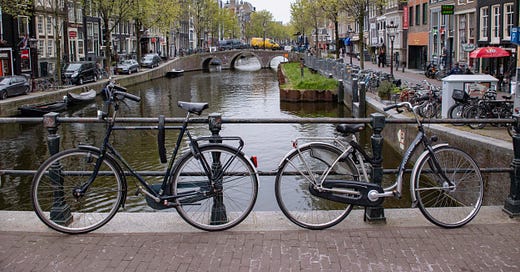I’m in Amsterdam this week for Micromobility Europe, a conference on all things micromobility. I’ll be moderating two panels: one on instant delivery and the other on how to make scooters profitable. If you’ll also be in Amsterdam and are interested in meeting up, reply to this email or send a note to oversharingstuff@gmail.com.
Ahead of the conference, I caught up with Oliver Bruce, host of the conference and Micromobility Podcast. We chatted about what micromobility startups owe to cities, the “Cambrian explosion” of new vehicle types, and how to make micromobility more equitable. This is also my first attempt at publishing one of these conversations as a podcast, so many thanks to Oliver for being game.
The transcript of our conversation has been condensed and edited for clarity.
Oversharing: This is the first Micromobility Europe conference happening in person since it was held in Berlin in 2019. Are things going to look a lot different?
Bruce: I think so. I mean, it's been an amazing time because I think right at the end of 2019, we had had the kind of initial boom of scooters. Even by then, it was pretty clear that the kind of shared micromobility model that I think a lot of people think of when they think of micromobility wasn't sustainable in the current form.
And yet we could see that there were a lot of other really cool vehicles that were just starting to emerge. So we had Vanmoof who were there, was it Vanmoof who announced then? I think they might've even announced their thing later with the S3. But it was clear that there were a couple of these vehicle manufacturers who were making things like e-bikes and that they were going to be really popular. And between then and now, Vanmoof has raised hundreds of millions of dollars. Cowboy also raised over $100 million. They've all just gone completely gangbusters and Europe really is the center for micromobility that we can see going forward.
I remember when we had it in Berlin, it was right when all the scooter companies were starting to develop their own models, and they were going through that shift from having bought off the shelf, consumer devices and deploying them en masse, which wasn't working so well.
I think one of the things that we've learned in this process has been the operators who have done really well—so in that I would say the Beams, the Tiers, the Dotts—a lot of them really have gone and worked very closely with a couple of suppliers, Segway and Okai, and have got a slightly customized version of a relatively standard scooter. And then they've chosen to differentiate themselves in other areas. And the companies that have really gone for ‘Hey, we want to build entirely our own custom hardware,’ which is the Birds and the Limes, have been the ones that have really struggled.
It was a particular era, there was just so much money in VC that was chasing these crazy unit economics that these scooters were putting out early on. And everyone thought that the growth trajectory was just going to be forever. Before cities were like, ‘Hey, wait, whoa, wait a second. You can't just drop 50,000 scooters in a city because you think this might be an interesting business. You have to work with us here.’ So yeah, in that regard, I think the European operators in particular had been focused on positive unit economics and scaling these businesses in a more sustainable way right since the get-go.
And I think that's more European. We saw the same thing with ride-hail: There are stronger regulations in Europe and at a city level. I think you could also say there's a stronger sense of community and civic responsibility. And so there's a greater expectation that companies have to work hand-in-hand with the city or the local borough, rather than just running amok, Wild West-style.
So a couple of things. One is the density of European cities is just a lot higher. So you come in and there's very defined road space allocation between cars and pedestrians, and there's not that much space between the buildings. You really have to fight for that space. Whereas in a lot of the American cities or where I'm from New Zealand or Australia, there's probably a little bit more buffer, in the sense that those infrastructures are oftentimes built post-war. They're built for cars. There's a little bit more fat in the street space allocation. And so in that regard, I think the Europeans are probably just a lot more evolved in this conversation about how do we properly allocate road space.
On infrastructure, I'm always interested in this question of whether companies like Uber that do rides or scooter companies or bike companies, sort of anything that is a top layer on public infrastructure should also be required to contribute to the maintenance of that infrastructure? I think there's an interesting question of like, if your business is making money on top of public roads, what is your obligation to invest in the maintenance of those roads?
Completely. I think this is the question of our age. I do the Micromobility Podcast, but I also have another podcast called the Infinite Block. You talk enough about micromobility and it makes you fall backwards into urbanism and thinking about zoning and roadspace allocation, and how do you do the funding for municipal infrastructure, etc.
When you've got a new technology for how we move on the roads, it inevitably changes what the requirements are for that infrastructure in some ways. And then it comes down to how do those decisions get made and who funds them? I was at Uber 2015 to 2018, and this is a big question that I had as well, which is, ultimately everybody who was operating specifically with ride-hailing, they're already paying into the road tax systems because they're using the roads. They’re using them slightly more than they probably would if they were a private citizen, but then they were in theory taking cars away from other trips.
I think ultimately we just have a really bad system for being able to calculate road use. We generally say, you know, this is a car. Either it pays taxes via fuel, or it pays it via some sort of road use charges. And I think ultimately what we're going to see is that better space allocation on the road would in theory lead to things like congestion charging. And that we would actually start charging for road space as it is being used in the moment.
It's been amazing to see some of the infrastructure go up just during the pandemic. London's been pretty aggressive, especially compared to an American city, building out cycle lanes and encouraging people to bike and everything. Boris got COVID and his takeaway was we need to cycle more and exercise more.
Loads of bike lanes have gone up just in my neighborhood. But again, this comes back to how it's a system and we make choices about what we value. There was this really interesting studyfrom a cycle advocacy group in London that found the average price of renting a cycle hanger parking spot is more than the cost of renting a car parking spot for a year. Which is crazy because you can fit like 10 bikes into the space that one car takes up.
Horace who's my co-host for the podcast oftentimes talks about the humility of micromobility and how it's a very different mindset that folks will come to this with. I happen to have an electric bike, it's a very fast way to go across town. But I just want to be able to go and park it. And yet someone will come along with a car and say, ‘Hey, I just want to be able to park it but I don't want to pay anything.’
I'm sympathetic to car owners. I mean, I own cars. I love cars. They're great. I just don't think that they're great in urban environments. I think that ultimately we will over time shift that, but it is a slow battle and it's really entrenched. The cost of car parking is oftentimes set at a legislative level where it isn't tied to CPI or anything. The effect of it is that you end up subsidizing car owners.
And it's hard to change the way a city is built. I went to see Straight Line Crazy a couple weeks ago, which I highly recommend if you have a chance to see it. It's a play based on the Power Broker with Ralph Fiennes as Robert Moses. It was amazing, but it really just drives home that point of once you build the roads, they're there, you've reshaped the community.
That's why the classic Robert Moses-Jane Jacobs fight is so important and has such a big legacy. Because you either build the road through the West Village or you don't.
Totally. Again, not to come back to micromobility, but I do think that the one thing that we can see and I've been told by a number of traffic engineers that they really like, is that—until now, in the toolkit of what they can do to offer a city about how you want to be able to allow citizens within the city to move around, you've had bikes, which in theory, nobody has really wanted to use unless you live somewhere like Amsterdam. So you have bikes, but they've not been very politically popular. Or you have public transit, but that has high levels of limitations around where the routes go and frequency. Or you have cars. And it's kind of defaulted, especially in the OECD countries, to cars. Where micromobility is interesting is that we're talking about electric bikes and scooters, but people kind of don't realize how big a deal the behavioral change is when you use an e-bike over a standard bank. You typically ride three to four times as long, you use them three times as much.
Also e-cargo bikes are really having a moment.
Totally. Oh yeah, it's amazing here in Amsterdam, just seeing how many there are, and I'm really excited. We've got a couple of e-cargo bike companies pitching next week at our conference talking about the economics of it, how does it work, why it lends itself to subscription-based businesses. It's the truck of the micromobility world. Our thesis is that micromobility is kind of everything up to about 500 kg (1,100 lbs) in terms of design space for vehicles. So there are other vehicles that are coming. We think that there's going to be this Cambrian explosion of new vehicle types, especially on the heavier end that will change what's available to people who live in cities.
Hopefully that makes it more accessible too, because I know part of the conversation in terms of equity and access has been about early devices being mostly geared toward the people who were making them, so younger and middle-aged white men.
Yep. Totally. As a younger middle-aged white man, I totally hear it.
And it's not that we don't want younger middle-aged white men on micromobility, but we also want everyone else on it too.
There's a woman KeriAnne who's going to be presenting from Whee!, the ones who are up in Norway doing e-cargo bikes, and her first slide, not to give everything away, is a quote from Cindy Gallop, who is totally awesome, saying ‘There's a lot of money to be made from taking women seriously.’ And she makes the point, which I think is very valid, and one of the things that I think as an industry hasn't been dealt with very well, is that yeah, a lot of the micromobility devices have been built for men. They're for commuting or something. But if you have to randomly add a bunch of kids and some groceries and other things as well, which is oftentimes how a woman might be traveling or having travel patterns, then those vehicles aren't necessarily the best.
Just to wrap it up, what are you looking forward to most at the conference?
The wonderful thing that I think we've managed to cultivate with the Micromobility America and Micromobility Europe conferences is that we've really built them for entrepreneurs. What we're interested in is meeting and supporting the builders, the people who are building vehicles for services that enable micromobility to really take off and around that.
There’s just some really amazing entrepreneurs who are going to be coming. And I really enjoy hearing them because they come up with crazy ideas and there’s some amazing new vehicles that are going to be there next week. It's just also a chance to come and hang out. And there's a really cool kind of culture that I think that exists with micromobility at the moment, which is it's very early. Like, this feels like we're at the start of the early days of the mobile computing revolution or something, which is, everybody can kind of tell it's a big deal, but it doesn't quite feel like we've had an iPhone moment yet in this world. But I think that it's coming. There's a palpable sense of we're onto something here.














Share this post